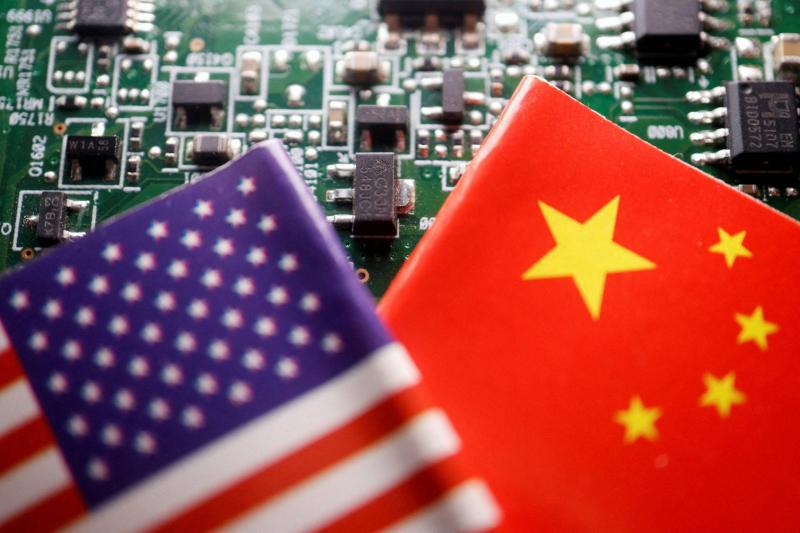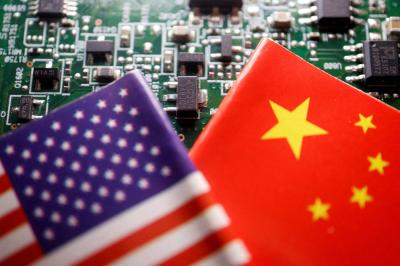Competition between the two superpowers, China and the United States, is intensifying in the realm of technology, specifically in the modernization and manufacturing of electronic chips.
The Guardian reported that within the "chip wars," semiconductors have become a flashpoint in the relationship between the U.S. and China. The battle for technology is increasingly critical in the 21st century and serves as a major source of hostility between the two global powers. U.S. Treasury Secretary Janet Yellen will travel to Beijing in an attempt to solidify economic relations, with the escalating chip war between China and the United States at the top of the agenda, according to the newspaper. Yellen is scheduled to visit China from Thursday to Sunday to meet with Chinese officials, as announced by the Treasury on Monday.
During her visit to Beijing, the Treasury Secretary plans to discuss with government members the importance of managing their relationship responsibly as the world’s leading economies, according to the Treasury Department. Yellen also intends to stress the necessity of "direct communication regarding areas of concern and working to address global challenges." The bilateral meetings have failed to set regulations for the chip production process.
U.S. President Joe Biden previously met with Chinese President Xi Jinping a few months ago in an effort to ease tensions. In mid-June, U.S. Secretary of State Antony Blinken traveled to Beijing, where he was welcomed by the Chinese president, an encounter interpreted as a diplomatic advancement. However, during a campaign rally in California at the end of June, Biden referred to his Chinese counterpart as a "dictator," a statement deemed provocative by Beijing. Last year, the Biden administration imposed restrictions on the export of American semiconductors and technology components to China while maintaining tariffs imposed by Trump on products exported from China to the U.S.
Despite diplomatic initiatives from both sides, competition in advanced technology between the two superpowers shows no signs of waning, according to the newspaper. Last Monday, Beijing exhibited an "antagonistic tone" towards Yellen's trip, deciding to impose restrictions on the export of two metals that the U.S. claims are essential for semiconductor and other advanced technology production. The Chinese state newspaper Global Times stated, "There is no reason for China to continue to deplete its mineral resources, other than to prevent it from pursuing technological advancement."
China's move to restrict exports of certain commonly used metals in semiconductor, electric vehicle, and advanced technology manufacturing has escalated the trade war with the United States and could worsen disruptions in global supply chains. An American semiconductor producer reported that it has applied for export permits to reassure investors. A germanium producer in China told Reuters that foreign inquiries and prices surged overnight. The Chinese Ministry of Commerce stated that as of August 1, it will control the exports of eight gallium products and six germanium products to protect its national security and interests, a step analysts considered a response to Washington's increasing efforts to curb China's technological advancement.
Peter Arkel, head of the Global Mining Alliance of China, stated, "China has hit at an awkward point for U.S. trade restrictions." He added, "Gallium and germanium are simply two types of highly significant secondary metals for certain technology products, and China dominates the production of most of these metals. The suggestion that another country might replace China in the short or even medium term is unrealistic."
These restrictions come as the U.S. is considering imposing new limits on the export of advanced semiconductors to China following a series of restrictions over the past few years. The U.S. and the Netherlands are also expected to impose further restrictions on the sale of semiconductor manufacturing equipment to Chinese chipmakers this summer as part of efforts to prevent the Chinese military from utilizing their technology. This occurs as the Biden administration is believed to be preparing to expand its own restrictions on selling advanced semiconductors to China, according to the newspaper.
U.S. officials have clarified their concerns about China's dominance in chip technology modernization and the fear that the People's Liberation Army could gain a qualitative edge over the U.S. military using American technology. Xi Jinping has instructed the People’s Liberation Army to become a "world-class" military by 2049, the centenary of the Chinese Communist Party's rule. A significant part of this effort involves developing autonomous weapons, including hypersonic missiles, and utilizing artificial intelligence (AI) in several fields, including electronic warfare.
It remains unclear how close China is to achieving this goal. According to the U.S. Department of Defense's annual report on China's military power, the People’s Liberation Army is "pursuing next-generation combat capabilities... through the expanded use of artificial intelligence and other advanced technologies at every level of warfare." However, while China leads the world in certain AI applications, such as facial recognition, its domestic industry is not yet capable of producing the most advanced semiconductors that support these technologies. Thus, Chinese companies and the military rely on imports for advanced chips, according to the newspaper.
The number of semiconductor manufacturers in China rose from around 1,300 in 2011 to 22,800 by 2020. However, this massive growth has concentrated on companies producing larger and less technologically advanced chips. Estimates indicate that China is far from its goal of achieving 70% self-sufficiency in semiconductors by 2025.




